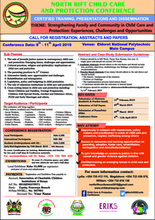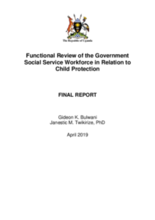Displaying 561 - 570 of 1623
This book largely focuses on unaccompanied minors who arrived in a European country in 2015, with special attention paid to the top-three nationalities of unaccompanied minors, namely Syrian, Afghan and Eritrean minors.
"Save the Children, UNICEF and partners have successfully reunited 6,000 children with their families after years of separation due to conflict," according to this press release from UNICEF, "a milestone for the Family Tracing and Reunification (FTR) programme in South Sudan since the first reunification of 420 children in 2014."
A recent media engagement on the effect of growing up in institutionalized care in Kampala, organized by Child’s i Foundation, revealed how children in orphanages are often mistreated, some even denied food, according to this article from New Vision.
The Association of Charitable Children Institutions of Kenya (ACCIK) in collaboration with the Ministry of Labour and Social Protection, Juvenile Justice Agencies, Moi University, Eldoret National Polytechnic and other stakeholders is organizing a Child Care and Protection Symposium.
This article investigates whether individuals who were orphaned as a child suffer long‐term consequences on their pro‐sociality.
An estimated 95,000 children in Rwanda are believed to have been orphaned during the genocide of 1994, according to this article from BBC News which tells the stories of some of those children, now adults, who are searching for living family members.
The main objective of the consultancy is to review and map the current tools and processes utilized under the Tubarerere Mu Muryango (TMM) programme, as well as within other programmes, and develop practical guidance, training materials and working tools to effectively apply the 12-TMM steps for reintegration of children with disabilities, starting from individual child and family assessment, community strengths/opportunities analysis, placement and post-reunification support.
The main objective of the consultancy is to review and map the current tools and processes utilized under the Tubarerere Mu Muryango (TMM) programme, as well as within other programmes, and develop practical guidance, training materials and working tools to effectively apply the 12-TMM steps for reintegration of children with disabilities, starting from individual child and family assessment, community strengths/opportunities analysis, placement and post-reunification support.
This report presents the findings of the “Functional review of the Government social service workforce in relation to child protection," which aimed to inform efforts geared towards strengthening the functionality of the social service workforce in Uganda, taking into account changes in the legal and policy framework and global trends in social protection and child protection in particular.
This video from 1MillionHome shares the story of one children's home in Kenya, Agape, that transitioned from a "traditional orphanage" to a family reunification center.


